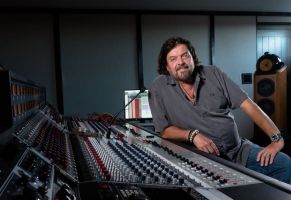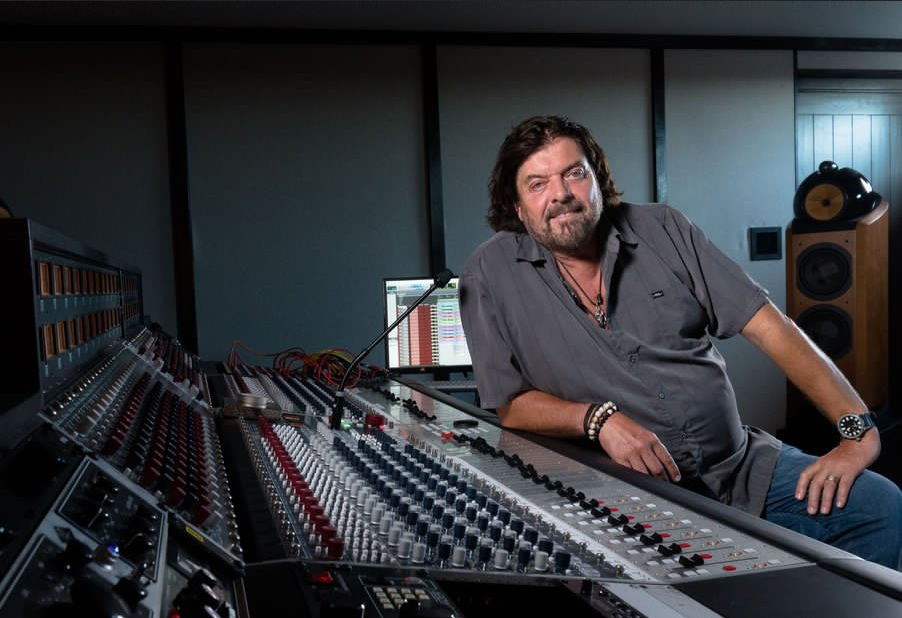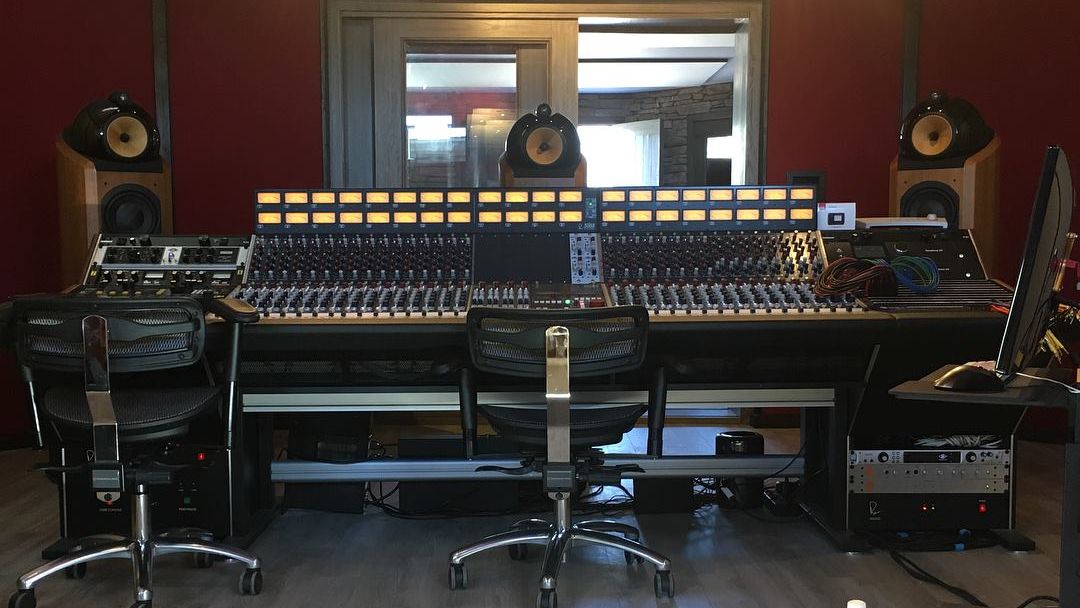This July, Alan Parsons and Julian Colbeck will be presenting a series of workshops in Santa Barbara, CA. Focusing on recording, mixing and training for teachers to dig in and teach production themselves, these Art & Science of Sound Recording master classes present a unique opportunity for attendees to work one-on-one with this GRAMMY Award-winning producer and musician in a state of the art facility.
Here we caught up with Julian Colbeck, who shared some insight into the experience and further thoughts on what they both find valuable in creating these experiences.
Why is it important to you and Alan to focus on sharing your knowledge through workshops and master classes?
Passing on knowledge was the original concept behind the Art & Science Of Sound Recording video series, so doing workshops and master classes is really just an extension of that original goal. In terms of why did we do that in the first place? For me, I'm keenly aware of the passing of time. The people who made what I think it's fair to say will remain the classic records in rock are now in their sixties or seventies. Many are already pushing up faders in that great studio in the sky. If that knowledge and that experience is not captured—and soon—then in a few years it'll be gone. We'll have the recordings of course, but not the thought processes and stories behind how they were made. We were hoping to do a master class with Andy Johns a few years ago. We had one brief meeting, and then within two weeks he was gone. Same with Geoff Emerick. The clock is ticking. For Alan, he's had an amazing career and he genuinely likes being open with people, sharing the knowledge that he's acquired over the years.
What have you learned yourself from doing so?
Especially with younger attendees, I've learned that they've become dependent on the visual not the audio side of recording, which is frankly terrifying. If we can accomplish one thing with younger students it's getting them on board with the fact a successful record doesn't have to look pretty. It doesn't matter how cool the plug-in looks. It doesn't matter how symmetrical the settings are on your EQ. Close your eyes, open—and trust—your ears.
How have people reacted to previous master classes and why do you think these experiences are special?
Although people always want tips and tricks, many say that the biggest take-away they get from a master classes is affirmation or validation of their own approaches. And that's very empowering. Countless people say that attending a master class has changed their life and we can see that. People have changed jobs, made records; one or two are now working with Alan on a professional basis. Having access to someone who's got to the top of the tree you're climbing gives you a very good idea of what it takes to get there yourself. There are lots of good people teaching classes, live, online or at a school. But there's nothing like there experience of spending quality time, in a studio, with a person who's made records that you know, like, and which have become classics. That's a pretty foolproof way of knowing you're getting training you can trust.
You have a book and video courses as well. What can people expect from those? How are they incorporated in the live sessions?
The live sessions are live manifestations of the approaches shown in the book and video series. No matter precisely a process is shown or described there's still nothing like seeing Alan on his hands and knees adjusting a mic on a guitar cab or EQ-ing a snare drum you're actually listening to. The reverse is equally true, especially with the video where everything moves at a pretty fast pace. Once you've seen and heard something live (say, triple tracking acoustic guitar with de-tuning) it makes reading about it or watching the process being set up on video even easier to assimilate. They're all complementary. And speaking of complimentary, a copy of either the videos or book comes with the ticket.
You've worked on some amazing projects, can you share what's been most recent for you?
 We did a private event at the National Music Center in Calgary recently where Alan got to re-visit the Stones Mobile, which was the world's first mobile recording studio. It still has the original Helios desk and still, according to Alan, smells the same as it did when he recorded Paul McCartney and Wings in it in the summer of 1972. The NMC houses a huge collection of old synthesizers, including TONTO, the amalgam of Moog and other modules assembled by Malcolm Cecil and Robert Margouleff used onTalking Book. As we were listening to TONTO in action Alan observed that Talking Book won best engineered Grammy in 1973 when Alan was up for the same award for Dark Side Of The Moon.
We did a private event at the National Music Center in Calgary recently where Alan got to re-visit the Stones Mobile, which was the world's first mobile recording studio. It still has the original Helios desk and still, according to Alan, smells the same as it did when he recorded Paul McCartney and Wings in it in the summer of 1972. The NMC houses a huge collection of old synthesizers, including TONTO, the amalgam of Moog and other modules assembled by Malcolm Cecil and Robert Margouleff used onTalking Book. As we were listening to TONTO in action Alan observed that Talking Book won best engineered Grammy in 1973 when Alan was up for the same award for Dark Side Of The Moon.
Alan won a Grammy for Best Immersive Audio Album with the 35th Anniversary Edition of "Eye In The Sky" release. Can you share a bit about the production approach to that?
This is not something I can really voice an opinion on I'm afraid except to say that Alan has long championed the cause of multi point audio from his quad mix of Dark Side Of The Moon to his ambisonic album Stereotomy, released in 1985, through to his latest album The Secret, which is available on DTS 5.1 48kHz Surround Audio DVD. One of the two tracks being mixed at the Santa Barbara master class on July 26th will be mixed in Surround so those who are fortunate enough to be able too attend will certainly get Alan's production approach from the horse's mouth.
You work on a ton of amazing products.. what are your go to software tools?
Professionally, we still live in a world dominated by Pro Tools and Final Cut and the reason for that is industry compatibility. It's possible these days are coming to an end as so much material is now being created by individuals working by themselves or as part of a small team, where individual choices can be made without that creating a problem down the line. Our mantra has always been to focus on the work not the tools.
You guys recently put together a new studio in Santa Barbara. Was it a challenge to outfit? What were your goals for the studio?
ParSonics is Alan's personal studio, not an ASSR venture. Alan has been a gear guy since Day One but he's also a pragmatist. He'll get the best sound he can out of the gear in front of him. He's retained his B&W 802s that he had in his project studio but he's really thrilled with his new Neve 5088. Aside from sounding terrific, it's also going to be an excellent board for showing and telling. When you're conducting classes it's vital people can follow what you're doing.
You've been in the biz for a long time. How has recording and mixing changed (aside from the obvious technology infusion.) ?
Recording and mixing used to be protracted and expensive things to do and that were only available to people with time and money, which essentially meant funded by a record label. You can argue that the 'filter' of having to get signed meant that only the best people got to make records and there's some truth in that. Nowadays, when you can create and distribute music for pennies on the dollar, it can result in people getting to make records before they've really developed their art and craft to really justify that. In the days before pitch and timing correction and before the words 'unlimited' and 'undo' came into our vocabulary, there were no shortcuts to getting a sound, playing a part right, or the process (as opposed to the 'state') of getting a mix. Democratization is good because it's opened doors to people who'd never have got the opportunity to make and record music. But it wouldn't hurt for people to slow down a bit—write a song, find your own sound as opposed to dial up a preset, practice until you can actually play your instrument as opposed to relying on technology. Recording and mixing used to be about making it as good as you can, but not 'perfection.' I'm not sure 'perfect' music is that interesting.
Can you share a quick recording or mixing tip?
'Value for money.' Make sure each recorded track or part can be heard and fulfill its role without having to be turned up so much as to unbalance the recording.
Find out more at www.artandscienceofsound.com
Julian Colbeck is the current CEO of Keyfax NewMedia and a former professional keyboard player of over 25 years, author of several music-related books and guides, the creator of Twiddly.Bits MIDI loops, the concept designer for the PhatBoy MIDI controller, and producer of several music technology DVDs and websites. He has played/collaborated with Greep, The New Seekers, Charlie, John Miles, Yes offshoot Anderson Bruford Wakeman Howe, and Genesis guitarist Steve Hackett. He also worked as a session player on numerous recordings, including the debut Vitamin Z album, produced by Alan Parsons, with whom he later collaborated on the 2009 DVD set, Alan Parsons' The Art & Science of Sound Recording.



